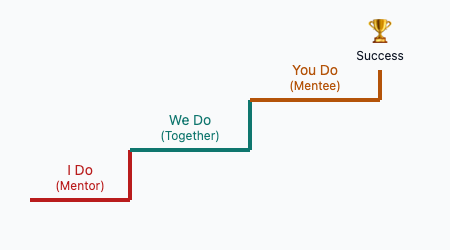Welcome to Coaching Toward Independence.
Mentoring isn’t just about sharing what you know — it’s about helping your mentee become a confident, self-sufficient engineer. Your job is to open doors, model how to solve problems, and encourage your mentee to think for themselves. When you do this with respect and trust, you empower your mentee to move beyond just following instructions and start charting their own path.
In this course, you’ll learn how to:
- Guide your mentee with questions and gentle prompts, rather than giving away answers
- Normalize asking questions and model essential problem-solving skills
- Navigate cross-functional collaboration and help your mentee integrate into the team
- Respect and understand the unique challenges faced by junior software engineers
You’ll see practical examples and get a chance to practice these skills, so you can help your mentee grow into a resilient, resourceful engineer.
Mentoring is less about giving answers and more about showing how to find them. When your mentee hits a roadblock, walk them through your thought process. Show how you use debugging tools, search for solutions, and weigh different approaches.
One of the most effective ways to help your mentee grow is to gradually shift responsibility as their skills and confidence increase. The “I Do, We Do, You Do” model is a simple framework you can use to guide this process:
-
I Do: You model the skill or approach while your mentee observes.
Example: “Let me show you how I debug this error and talk through my thought process as I go.” -
We Do: You and your mentee work through the problem together, with you offering guidance and asking questions.
Example: “Let’s look at this error message together. What do you notice? Where do you think we should start?” -
You Do: Your mentee takes the lead, applying what they’ve learned, while you step back and offer support as needed.
Example: “Why don’t you try debugging this one? I’m here if you get stuck, but I’d love to see how you approach it.”
This makes problem-solving less mysterious and builds your mentee’s confidence to tackle issues on their own.

This approach helps your mentee build confidence and independence, one step at a time. As you mentor, pay attention to when your mentee is ready to move from observing, to collaborating, to leading. Make sure to celebrate each milestone along the way.
Software engineering is a big field consisting of backend, frontend, databases, architecture, and more. It’s normal for new engineers to feel overwhelmed by all the options. As a mentor, you can help your mentee see the big picture and encourage them to try different areas. Pay attention to what sparks their interest, and reassure them that it’s okay to explore before choosing a specialty.
Try saying:
"It’s perfectly fine to try out different areas before you decide what you want to focus on. Over time, you’ll notice what excites you most."
This normalizes exploration and helps your mentee feel safe to experiment in other areas of the software system.
One of the best ways to help your mentee grow is to ask questions that prompt them to think critically. Instead of giving direct answers, offer supportive nudges that help them reason through the problem.
Try asking:
- "What trade-offs did you consider when choosing this approach?"
- "How might this design handle a sudden increase in users?"
These questions encourage your mentee to reflect, analyze, and develop their own judgment. This would be part of the We Do step in the model mentioned earlier.
Here’s how this might sound in a real conversation:
- Natalie: Hey Milo, I’m not sure if I should focus on backend or frontend work. I’ve tried both, but I feel a bit lost about where to go next.
- Milo: That’s totally normal, Natalie. When you worked on the frontend, what did you enjoy most? And how did that compare to your experience with backend tasks?
- Natalie: I liked seeing the results right away on the frontend, but I also found it satisfying to solve logic problems on the backend.
- Milo: Sounds like you have strengths in both areas. How about you keep exploring each for a bit longer? Over time, you’ll notice which one excites you more. There’s no rush to specialize.
- Natalie: That makes sense. Thanks, Milo. By the way, I’m stuck on this error in my backend code. The console says “TypeError: undefined is not a function,” but I can’t figure out why.
- Milo: Let’s look at the error message together. Does it point to a specific line? If not, maybe we can check where you’re calling that function and see if it’s defined properly. What have you tried so far?
- Natalie: I checked the function name, but maybe I missed something. I’ll double-check and see if it’s being imported correctly.
- Milo: Great approach. Let me know what you find, and if you’re still stuck, we can dig deeper together.
Milo normalizes Natalie's uncertainty, asks open-ended questions, and models a calm, step-by-step approach to problem-solving — all without jumping in with the answer.
Your goal as a mentor is to help your mentee become a resilient, independent problem-solver. That means celebrating their progress, encouraging them to try new things, and giving them space to make mistakes and learn.
